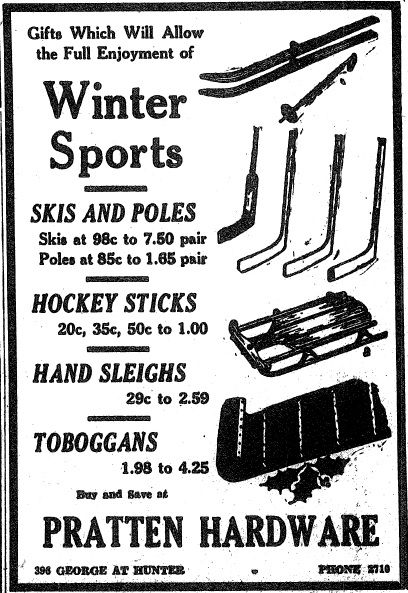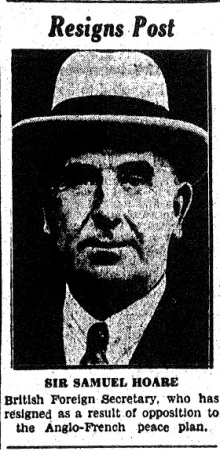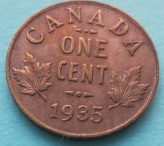
Peterborough Examiner, December 19th, 1935.
“Preparations looking forward to the day when airplanes will fly the Atlantic Ocean on fixed schedules are progressing past the stage of mere planning,” wrote the Peterborough Examiner on December 18th, 1935, and I must say that it is always interesting, in researching this series, to come across the first encounters with things that we take for granted. The article went on to speak of luxurious airliners with bunks, “promenade cabins,” meal service, and the like. And indeed, the first transatlantic passenger flight was only about three years away.
But what else was going on as 1935 drew to a close? Read on, for disastrous events involving Ethiopia, a distinct shortage of small change, and girls on skates bearing hamburgers and/or hockey sticks…
As exciting as the possibilities of intercontinental passenger flights were, they were not the big foreign story this week in 1935. That, sadly, was once again warfare, and in this case it was the ongoing conflict between Benito Mussolini’s Italy and the Ethiopian Empire, at that time ruled by Haile Salassie. Italy had invaded the East African country earlier in the year, prompting the League of Nations to impose sanctions.
The Peterborough Examiner, meanwhile, published a rather strange editorial on December 17th, worrying that the war in East Africa would lead to a racial conflict that “would not be in Africa alone.” “The thing would spread like a contagious disease,” fretted the newspaper, which went on to warn that “[t]hose who see no danger in the Ethiopian situation are indeed blind as can be.”

Peterborough Examiner, December 19th, 1935.
By mid-December, the main focus was on attempts by Britain and France to broker an end to the Ethiopian war. Under the so-called Hoare-Laval Pact, Italy would be given control of most of the Ethiopian Empire, and this fact caused public outrage in Europe when details of the deal were leaked by the press. And why were the provisions of the pact so favourable to Mussolini? Simply put, the British and French were eager to keep Italy from turning to Hitler’s Germany for support. In the end, the anger over the Hoare-Laval Pact scuttled it, and cost both British Foreign Secretary Samuel Hoare and French Prime Minister Pierre Laval their jobs. Mussolini’s Italy went on to win the war and occupy Ethiopia anyway, which earned the fascist government great, if fleeting, popularity at home. Worse, feeling aggrieved and isolated by the League of Nations sanctions, Italy withdrew from the world body and did indeed ally itself with Germany. The League itself, meanwhile, came to be seen as ineffective in controlling international disputes. A disastrous episode all around.
Back in Canada, efforts to combat the Great Depression continued apace. In October, Canadians had voted out the Conservative government of Robert Borden, restoring Liberal William Lyon Mackenzie King to the Prime Minister’s chair. King immediately convoked a conference between the federal and provincial governments, and the December 16th Examiner reported on the what the next step would be:
“Of primary importance is the appointment of the national commission on unemployment which Prime Minister Mackenzie King had hoped to get working before the end of the year. This body will be armed with wide powers to investigate the whole unemployment situation throughout the country and to supervise unemployment relief activities. Hope was expressed [that] the operations of this commission might lighten to some extent the burden of the municipalities…”
And of course, it was Christmas-time. Depression or no, people were turning out to get their shopping done, and this was having an interesting fiscal effect: the city of Toronto was running out of pennies. The December 17th Examiner blamed “Christmas business and the tendency of stores to fix prices so that coppers are required to make change.” Fortunately, reported the paper, relief was on the way, with the Royal Canadian Mint primed to release a million new pennies into circulation in the coming days.
In Peterborough, meanwhile, it must be said that there was a lot of thunderous civic news. Christmas preparations were going on here as elsewhere, and the December 16th Examiner noted that the local Kiwanis Club was stepping up to help out children in the city’s shelters:
“…each member will take it upon himself to bring a measure of Christmas cheer to one or another of the boys and girls during the interval before Christmas.”
A movie outing, to the Capitol Theatre, was also being arranged for the kids in the shelters.
Sporting-wise, the ice was finally good enough at the Brock Arena to get the local hockey season underway, and fans at the rink could look forward to some added creature comforts for the 1935-36 campaign. As the December 18th Examiner reported:
“Hamburgers and hot dogs will be wrapped and sold, not only at the booth, but to the folks in their seats between periods. [Concession stand owner Percy Harrison] will have a girl in the booth and six on skates, going around by the boards serving hungry customers.”
And, if local organizers had their way, there would be other Peterborough girls on skates as well. The Western Clock Company and General Electric, both of whom had company women’s hockey teams, were setting up a local women’s league, and it was hoped that they could attract clubs from some neighbouring towns. Plan B, in case other teams could not be found, would be for General Electric to host “a four-team shop loop,” as the December 18th newspaper described it.
And that is it for 1935, I think! Next week, we will check in with Christmas of 1936, but in the meantime, you can check up on what was happening around here at this time in 1883. Thank you for reading!


